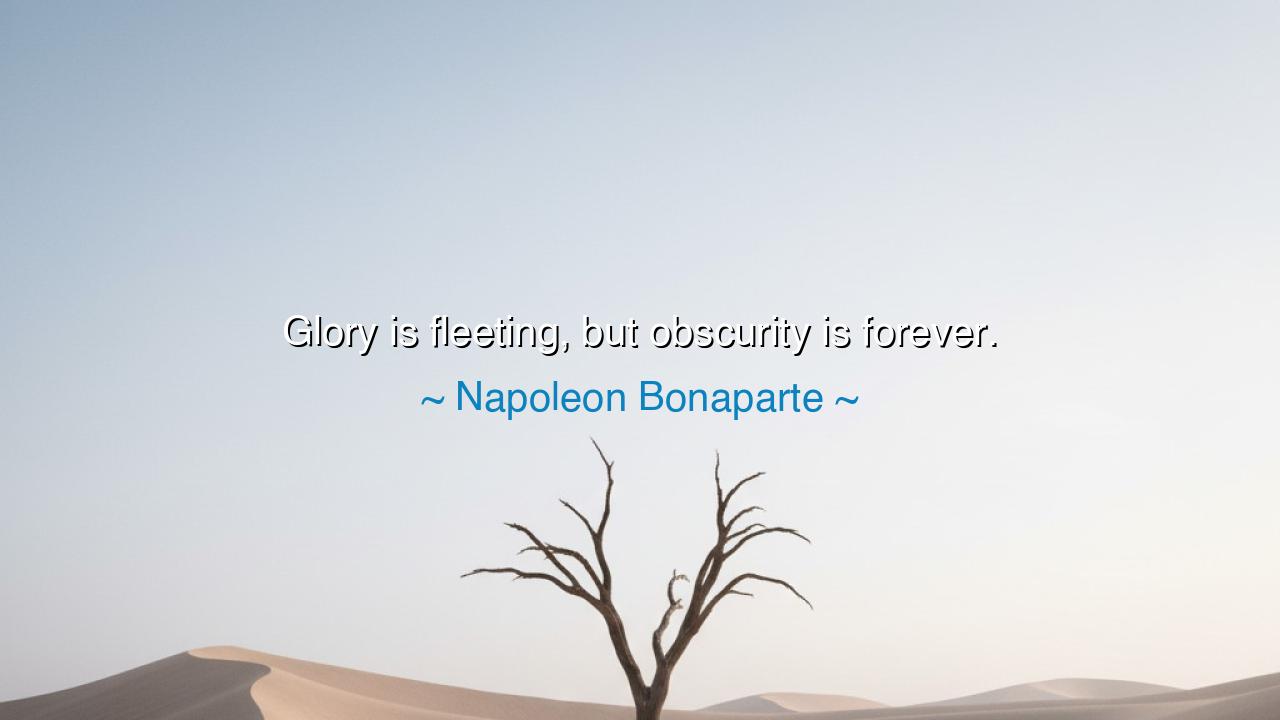
Glory is fleeting, but obscurity is forever.






Host: The museum was closing for the night. The corridors were dim, the last rays of sunset sliding through the tall windows, brushing over marble statues and the stillness of forgotten centuries. The air smelled of dust and history — of greatness embalmed in silence.
Host: Jack stood before a vast portrait, the kind that demanded reverence: a general on horseback, sword aloft, frozen mid-victory. The plaque beneath read “Napoleon Bonaparte, 1812.”
Jeeny approached quietly, her footsteps soft on the polished floor. She looked at Jack, then at the painting — the heroic posture, the immortal gaze.
Jeeny: “He once said, ‘Glory is fleeting, but obscurity is forever.’”
(she tilted her head, studying the face)
“Ironic, isn’t it? The man who wanted to conquer the world still fighting for immortality two centuries later.”
Jack: “He got it. His name outlived his empire.”
Jeeny: “Did he really win, though? Or did he just trade one kind of death for another?”
Host: The lights dimmed slightly, leaving their reflections ghosted in the glass that covered the painting — two modern souls staring back at a man who had tried to rewrite destiny.
Jack: “Everyone dies twice. First when they stop breathing, second when no one says their name anymore. Napoleon just found a way to delay the second death.”
Jeeny: “At the cost of how many others’ first?”
Host: Her tone was quiet, but her words cut through the air with the clean precision of truth. Jack turned toward her, his face hardening.
Jack: “You think ambition is a sin?”
Jeeny: “Not ambition. Worship of it. There’s a difference.”
Jack: “Without that hunger, civilization would’ve never moved forward. The same fire that burned cities built them too.”
Jeeny: “Yes. But glory burns fastest. And it rarely leaves warmth behind.”
Host: A long silence settled — heavy, alive. The shadows of the statues stretched across the floor like questions that had been waiting too long for answers.
Jack: “You talk like obscurity’s some kind of peace. But isn’t being forgotten the same as never having lived?”
Jeeny: “No. Being forgotten means the world moved on. Not that it didn’t matter.”
Jack: “Tell that to the painters who died penniless, or the soldiers buried in unmarked graves. You think they’d be content knowing their obscurity is eternal?”
Jeeny: “Some of them didn’t fight for remembrance. They fought for meaning. That’s the difference between fame and purpose, Jack.”
Host: Her voice softened, but her eyes held steady — a light that could withstand even cynicism.
Jeeny: “You remember Vincent van Gogh? He painted over two thousand works, sold one. He died thinking he’d failed. But his obscurity wasn’t forever. It just took the world time to listen.”
Jack: “And if the world hadn’t?”
Jeeny: “Then his art would still have been real — even if unseen.”
Host: Jack looked back at the painting of Napoleon — the raised sword, the storm behind him, the hollow triumph sealed in oil and legend.
Jack: “You think that’s enough? To do something that might never be remembered?”
Jeeny: “It has to be. Otherwise, every quiet act of kindness, every hidden brilliance, every unsung sacrifice would mean nothing. But they do mean something. You just can’t measure it in applause.”
Jack: “So you’d rather be forgotten than remembered wrongly?”
Jeeny: “I’d rather live truthfully than be immortalized falsely.”
Host: A faint hum filled the silence — the low vibration of the closing hour warning. Outside, the last of the sunlight broke into shards of gold through the window, landing across the marble floor like fallen halos.
Jack: “You know, Napoleon wasn’t wrong. Glory fades. Obscurity lasts. But maybe that’s the point — obscurity’s what humbles us. It’s what makes the moments we do touch the world so miraculous.”
Jeeny: “Exactly. The tragedy isn’t being obscure. It’s living only to avoid it.”
Host: Jack’s reflection met Napoleon’s in the glass — two men centuries apart, bound by the same question. He spoke softly, almost to himself.
Jack: “Do you think he knew? That his own glory would one day be a museum exhibit — his victories reduced to plaques and lighting schedules?”
Jeeny: “Maybe he didn’t care. Maybe all he wanted was to be remembered long enough to forget he was mortal.”
Jack: “And what do you want?”
Jeeny: “To live in such a way that even if no one remembers me, I’ll still remember myself.”
Host: The overhead lights flickered once — the universal signal of endings. Jeeny gathered her coat, her movements slow, deliberate, like someone walking through memory.
Jack: “You ever think about it? How the world forgets almost everything?”
Jeeny: “All the time. And yet… it keeps creating. Every dawn, every song, every birth — the world keeps writing stories it knows won’t last. That’s how you know life’s not about glory.”
Jack: “Then what is it about?”
Jeeny: “Presence. Creation. Love. The things obscurity can’t touch.”
Host: She turned toward the painting one last time — the conquering emperor, immortal yet alone.
Jeeny: “He was wrong about one thing, though.”
Jack: “What’s that?”
Jeeny: “Obscurity isn’t forever. It just lasts until someone remembers — even for a second — that you mattered. And that second… is enough.”
Host: The camera lingered — on the faint reflection of two figures fading into the dark, on the candle glow of the exit sign, on the silent majesty of a man trapped inside a frame.
Host: The museum lights dimmed completely now, leaving only the faintest shimmer from the street outside. For a heartbeat, it was as if Napoleon’s painted eyes softened — not in triumph, but in understanding.
Host: Because glory, like the light, always fades.
But meaning — though unseen — remains,
quiet and eternal,
in the places where memory yields to love.






AAdministratorAdministrator
Welcome, honored guests. Please leave a comment, we will respond soon